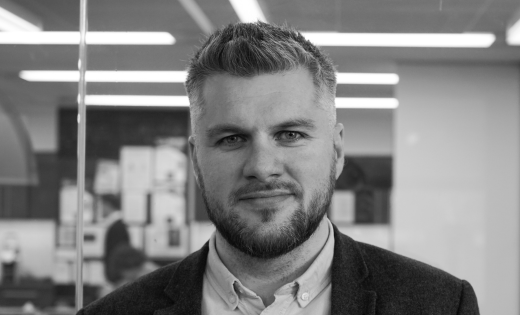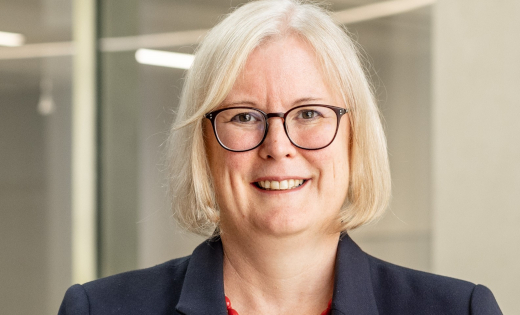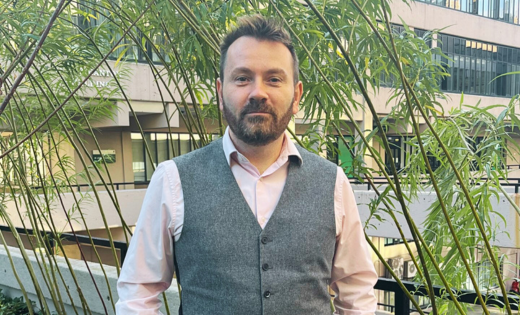Key appointments to help develop world-leading research
Three new appointments have been announced to further champion the University's world-leading research and innovation.
Professors Andrew Macdonald, Cath Noakes and Ed Manley

Cath Noakes, Professor of Environmental Engineering for Buildings at the School of Civil Engineering; Ed Manley, Professor of Urban Analytics at the School of Geography; and Andrew Macdonald, Professor of Tumour Virology in the School of Molecular and Cellular Biology, are the new Pro-Deans for Research and Innovation in their respective faculties.
Following in the footsteps of their predecessors, they will play an instrumental role in creating an environment in which colleagues across the University can continue to deliver transformational research to tackle some of the most pressing challenges facing the world today.
Professor Nick Plant, Deputy-Vice Chancellor: Research and Innovation, said: “I look forward to welcoming Cath, Ed and Andrew to their new roles and working with them to provide the strategic vision and support to successfully deliver our Research and Innovation strategy.
“All three bring a passion for supporting staff to achieve international and interdisciplinary academic excellence, and a wealth of experience in delivering world-class, impactful research and innovation.”
Honored and excited

Professor Ed Manley, who takes up the role in September, said: “I’m very excited to start work as the Pro-Dean: Research and Innovation in the Faculty of Environment and honored to represent the faculty and University in this role.
“There’s an incredible range of world-leading research taking place across our faculty, and part of my role will be championing our research and researchers, and maximising the benefits of our work across wider society.”
Ed works with the Centre for Spatial Analysis and Policy (CSAP) research cluster and the Leeds Institute for Data Analytics (LIDA). Additionally, he holds a Fellowship at the prestigious Alan Turing Institute and an Honorary Professorship at University College London (UCL). He was awarded the coveted Phillip Leverhulme Prize for Geography last year.
Ed co-directs LIDA: Societies and leads the Special Interest Group in Behavioral Models and Machine Learning at the Alan Turing Institute. His research focuses on human mobility in cities, using new data and computational methods to understand spatial behaviors that influence urban activity and dynamics.
Championing the breadth of research

Professor Cath Noakes, who previously served as Director of Research and Innovation within the School of Civil Engineering, will take up her new role in January.
She said: “I’m very much looking forward to taking on this role and working with colleagues across the Faculty of Engineering and Physical Sciences (EPS) and beyond.
“We do some fantastic science and engineering in the faculty, and I’m keen to champion the breadth of our research and to deliver a sustainable and inclusive research strategy for the next five years.”
Cath’s expertise in fluid dynamics, ventilation, indoor air quality and infection control in the built environment has been instrumental in COVID-19 research and policy advice. She was honored with an OBE for her services during the pandemic and has been part of the UK government’s Scientific Advisory Group for Emergencies (SAGE).
In tribute to her efforts during the pandemic, the Royal Society recently awarded Cath its highest distinction for interdisciplinary work between life sciences and other specialties – the 2023 Gabor Medal.
Beyond her research, Cath is deeply committed to inspiring the next generation of women in engineering. She said: “I want this award to demonstrate to young people – and particularly young women who are under-represented in the profession – that engineering is a deeply rewarding profession.”
Huge privilege

Professor Andrew Macdonald, who has held several leadership positions in the School of Molecular and Cellular Biology, begins his new role at the end of October.
Andrew joined the University in 2006 under a five-year RCUK-funded independent fellowship. His research focuses on small DNA tumour viruses that cause diseases in humans, specifically the mechanistic impact of Human Papillomavirus (HPV) on cancer.
Andrew is on the editorial board of Cancers and is a member of the Canadian Institute of Health Research Panel and the Cyprus Research Foundation.
Commenting on his new role, Andrew said: “The Faculty of Biological Sciences is an incredibly exciting place to be, so it’s a huge privilege to lead the charge on our research portfolio. I’m very much looking forward to building on the excellent work of my predecessor and creating an inclusive and sustainable research strategy that puts our science on the world stage.”
Invaluable contributions
Cath will take over the Pro-Dean role from Dr Oliver Harlen, while Ed takes over the reins from Professor Alan Haywood, who’s to become Deputy Dean of the Faculty of Environment. Andrew will step into the Pro-Dean role for FBS when Professor Lisa Collins leaves the University in October.
Professor Nick Plant said: “I would like to extend my heartfelt appreciation to our outgoing Pro-Deans – Dr Oliver Harlen, Professor Alan Haywood and Professor Lisa Collins – for their invaluable contributions during their tenures.
“Their unwavering dedication to fostering international and interdisciplinary academic excellence, as well as their wealth of experience in driving world-class research and innovation, has been instrumental in shaping our institution’s success. We’re immensely grateful for their outstanding leadership.”
Posted in: University news